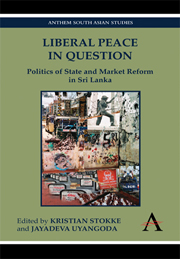Book contents
- Frontmatter
- Contents
- List of Illustrations
- List of Contributors
- 1 Liberal Peace in Question: The Sri Lankan Case
- 2 Travails of State Reform in the Context of Protracted Civil War in Sri Lanka
- 3 Fallacies of the Peace Ownership Approach: Exploring Norwegian Mediation in Sri Lanka
- 4 The Politics of Market Reform at a Time of Ethnic Conflict: Sri Lanka in the Jayewardene Years
- 5 From SIHRN to Post-War North and East: The Limits of the ‘Peace through Development’ Paradigm in Sri Lanka
- 6 Buying Peace? Politics of Reconstruction and the Peace Dividend Argument
- 7 Women's Initiative in Building Peace: The Case of Northern Sri Lanka
- 8 Liberal Peace and Public Opinion
- Notes
- References
4 - The Politics of Market Reform at a Time of Ethnic Conflict: Sri Lanka in the Jayewardene Years
Published online by Cambridge University Press: 05 March 2012
- Frontmatter
- Contents
- List of Illustrations
- List of Contributors
- 1 Liberal Peace in Question: The Sri Lankan Case
- 2 Travails of State Reform in the Context of Protracted Civil War in Sri Lanka
- 3 Fallacies of the Peace Ownership Approach: Exploring Norwegian Mediation in Sri Lanka
- 4 The Politics of Market Reform at a Time of Ethnic Conflict: Sri Lanka in the Jayewardene Years
- 5 From SIHRN to Post-War North and East: The Limits of the ‘Peace through Development’ Paradigm in Sri Lanka
- 6 Buying Peace? Politics of Reconstruction and the Peace Dividend Argument
- 7 Women's Initiative in Building Peace: The Case of Northern Sri Lanka
- 8 Liberal Peace and Public Opinion
- Notes
- References
Summary
This chapter explores the politics of market reform in Sri Lanka and its relationship to the escalating ethnic conflict during the J.R. Jayewardene period of 1977–88. It describes how the exacerbation of the ethnic conflict in these years occurred in the context, and as a largely unintended by-product, of a larger political strategy directed primarily at winning consent for a radical programme of marketisation. In doing so, it also draws a broader conclusion that due to certain enduring features in the structure of Sri Lankan electoral politics, market reforming governments are inherently in a weak position to implement state reforms of the calibre necessary to address the ethnic conflict.
This broader conclusion has particular relevance in understanding the political strategies and coalitions that emerged subsequently in the 1990s under Presidents Premadasa and Kumaratunga. It also provides a broad analytical framework to evaluate the failure of the ambitious peace process from December 2001 to April 2004 under the United National Front (UNF) government of Ranil Wickremasinghe. Wickremasinghe explicitly crafted a two track parallel agenda of accelerated market reforms and deep concessions on the ethnic conflict. Leaving aside the specificities of this project and the many idiosyncratic problems in its formulation and implementation (see for example Bastian 2005 and Venugopal 2009), the comparative historical experience of the 1980s provides insights as to the inherent limitations of this approach.
Introduction
In 1977, the UNP government of J.R. Jayewardene initiated a landmark change in the direction of Sri Lanka's economic policies.
- Type
- Chapter
- Information
- Liberal Peace in QuestionPolitics of State and Market Reform in Sri Lanka, pp. 77 - 102Publisher: Anthem PressPrint publication year: 2011
- 4
- Cited by



